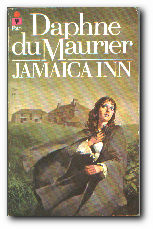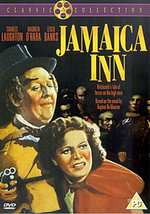

The Conception of the novel, Jamaica Inn -
by Daphne du Maurier


Foolheartedly, long ago, on a November afternoon, a friend and I departed on horseback from Jamaica Inn with the happy intention of calling on an elderly lady living at Trebartha Hall near North Hill. Surely, we told ourselves, it would be no more than forty minute's ride at most; and if we stayed to tea then we must make up our minds to skirt the moor on our homeward track, and jog back to Jamaica Inn by road. Irresponsible, we trotted off across the moor no later than two o'clock, only to find after an hour or more that we were little nearer to our destination, that tors and boulders inaccessible on horseback, even perhaps on foot, barred our passage. The track leading us on descended to a slippery path that disappeared, while beneath us a bettered gate, swinging by the hinges, gave access to a swollen stream. The day, comparatively fine until that moment, darkened, and a black cloud, trailing ribbons, hovered above our heads and burst.
In
a moment all was desolation. The ominous stream rushed by with greater
swiftness, turning to a torrent. Forcing the horses up a steep incline, to
put distance between ourselves and the running water, our heads bent low to our
saddles, we plunged onward, seeking escape. A deserted cottage, humped
beneath the hill, seemed our only hope - at least it would be temporary
refuge until the cloudburst ceased. We rode towards it, dismounted, and
led our horses to the rear. The cottage was not only empty and what roof
there was had been repaired with corrugated tin, so that the cascading rain
sounded like hailstones on its surface. We leant against the fungoid walls
and brooded, Trebartha Hall a hundred miles away, Jamaica Inn an equal
distance, and all the while the rain fell upon the corrugated roof to echo in a
splashing water-butt near by. I had never known greater despondency.
It
rained for a full hour, then turned to drizzle and dank fog, by which time our
world was murky and we had lost all sense of compass points. Emerging from the
ruins my companion, a better horsewoman than I and owner of both our
steeds, looked about her and observed, "There's nothing for it but to get
into the saddle, leave our reins loose on their necks, and let
them lead us home."
I was not impressed by her suggestion, for where was home to the horses - thirty miles or more to Fowey, or back across the moors to Jamaica Inn? We mounted once again, darkness and silence all about us, save for that dreary patter on the cottage roof, and somewhere to our right the hissing stream.
The
horses, sure-footed even amongst dead heather and loose stones, plodded forward
without hesitation, and there was some relief at least to be away from the
abandoned cottage and in the open, however desolate, for there had been no
warmth within its walls, no memories of hearths glowing with turf fire kindled
by owners in the past. Surely whoever lived there before he let it fall to ruins had been sullen and morose, plagued by the Withey Brook
that ran somewhere below his door, and in despair went out one night and drowned
himself. I suggested this to my fellow traveler, who was not amused,
especially as the horses seemed attracted by the river sound. Gaining higher
ground we found ourselves facing a new hazard in the form of
what appeared to be a disused railway track, upon which our mounts slithered and
stumbled. A railroad in mid-moor. It could not be. Unless we
had both gone mad and this was fantasy.
"A line for trolleys," said my companion, "leading to a stone quarry. If the horses take us there they'll break their legs. Better dismount." Bogs, quarries, brooks, boulders, hell every side, we led the horses from the slippery track, and then got up on our saddles once again. I remembered an illustration from a book read long ago in childhood, "Sintram and His Companions", where a dispirited knight had traveled such a journey with the devil in disguise, who called himself The Little Master. It showed a terrified steed rearing near a precipice. This was to be our fate, and The Little Master would come and claim us.
The horses, bolder now they were free of the trolley-lines, headed steadily forward, straight across the moor, possibly in the direction of those menacing crags that we had seen in early afternoon, pointing dark fingers to the sky, which, we knew very well, lay contrary to any path for home.
It was seven, it was nine, it was midnight - too dark to see our watches, and fumbling fingers could not strike damp matches. On, forever on, nothing on all sides but waste and moor.
Suddenly my companion cried, "They've done it.they've done it. Isn't that the road?"
Peering into the darkness ahead I saw a break in the rising ground, and a new flatness, and there, not a hundred yards distant, the blessed streaky wetness of the Launceston-Bodmin road, and surprisingly, unbelievably, the gaunt chimneys of Jamaica Inn itself.
"I told you so," called the expert, "horses always know the way. They travel by instinct. See, the people from the Inn have come to look for us,"and sure enough there were figures with tossing lanterns wandering to and fro upon the road, and welcoming lamplight shone from the slated porch. In an instant fear was forgotten, danger had never been. It was just eight o'clock, the landlord and his wife had only then begun to think of us, and here was the turf fire for which we had longed, brown and smoky sweet, a supper of eggs and bacon ready to be served with a pot of scalding tea.
Today
all is changed, and, as the poet Yeats once said, "changed utterly."
Motor-coaches, cars, electric light, a bar, dinner of river-trout, baths for the
travel-stained instead of a cream-jug of hot water. As a motorist I pass
by with some embarrassment, feeling myself to blame, for out of that November
evening long ago came a novel which proved popular, passing, as fiction does,
into the folk-lore of the district. As the author I am flattered, but as a
one-time wanderer, dismayed.